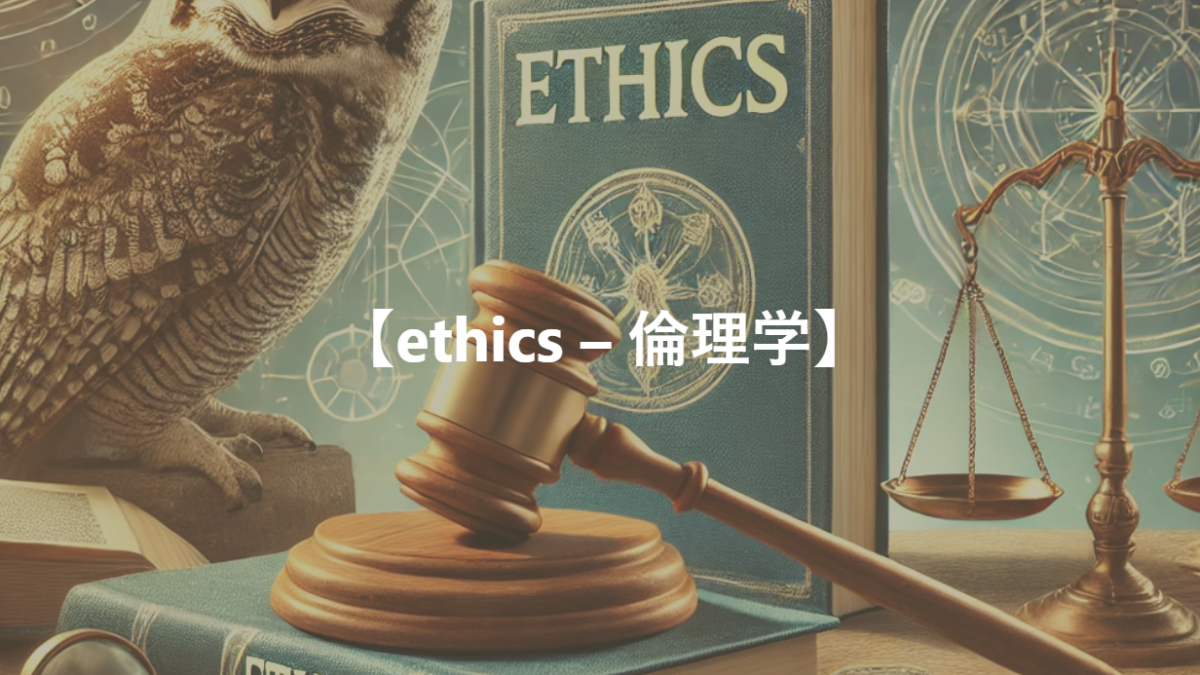語源・類義語・反対語・例文
【Ethics – 倫理学】という単語の語源とか由来を知っていますか?
“ethics” の語源と由来は、ギリシャ語の “ethikos” から派生しています。”Ethikos” は、「倫理的な」という意味を持ちます。この言葉は、さらにギリシャ語の “ethos”(習慣、性格)に由来しています。英語の “ethics” は、倫理学という意味の名詞として使用され、個人や社会の道徳的価値観や行動原則に関する研究や理論を指します。
この単語の類義語・反対語を教えてください。
類義語:
- Morality(道徳)
- Principles(原則)
- Standards(標準)
- Virtue(徳)
- Morals(道徳観)
- Values(価値観)
- Conscience(良心)
反対語:
- Immorality(非道徳)
- Unethical Behavior(非倫理的な行動)
- Corruption(腐敗)
- Amorality(無道徳)
- Dishonesty(不誠実)
- Injustice(不正義)
- Unscrupulousness(悪徳)
この単語に似た単語で間違いやすい単語はありますか?
- Morality(道徳): 「Ethics」と「Morality」はよく似ていますが、微妙な違いがあります。「Ethics」は一般的には倫理学、つまり道徳の理論や原則を学問的に考察する分野を指します。一方、「Morality」は個人や社会が正しいと考える行動の規範や原則を指し、もっと個人的、文化的な意味合いが強いです。
- Philosophy(哲学): 「Ethics」は哲学の一分野ですが、「Philosophy」はもっと広範な概念で、存在、知識、価値、理由、心、言語などに関する根本的な問いに対する研究を含みます。「Ethics」はこの大枠の中の一部です。
- Values(価値観): 「Values」は個人や社会が重視する信念や理想を指します。「Ethics」と似ていますが、より広範囲の概念で、倫理観だけでなく、文化、宗教、個人的な嗜好などを含みます。
この単語を使った例文を5つほど教えてください。
- The study of ethics explores questions about what is morally right or wrong and how we should behave in different situations. (倫理学の研究は、何が道徳的に正しいか間違っているか、さまざまな状況でどのように行動すべきかについての問いを探求します。)
- The company’s code of ethics sets forth the principles and standards that employees are expected to follow. (企業の倫理規定は、従業員が遵守することが期待される原則と基準を示しています。)
- Medical professionals adhere to a strict code of ethics that emphasizes patient welfare and confidentiality. (医療専門家は、患者の福祉と機密性を重視する厳格な倫理規定に従って行動します。)
- The ethical dilemma presented in the case study required careful consideration of competing values and ethical principles. (ケーススタディで提示された倫理的ジレンマは、競合する価値観と倫理原則の注意深い考慮を必要としました。)
- Ethical behavior is not only about following rules, but also about acting with integrity and considering the impact of our actions on others. (倫理的な行動は、単に規則に従うことだけでなく、誠実さを持って行動し、自分の行動が他人に与える影響を考慮することでもあります。)
【ethics – 倫理学】のコロケーション
- Business Ethics(ビジネス倫理): ビジネスの文脈における倫理的な行動や決定に関する原則を指します。企業の社会的責任や公正な取引の実践などが含まれます。
- Medical Ethics(医療倫理): 医療の分野での倫理的な問題や決定に関する原則を意味します。患者の権利、治療選択、機密保持などのテーマが含まれることが多いです。
- Ethics Committee(倫理委員会): 倫理的な問題を扱う公式な委員会を指し、特に研究や医療分野での倫理的な審議を行います。
- Professional Ethics(専門職倫理): 特定の専門職(例えば、弁護士、会計士、教員など)に適用される倫理規範や行動規範を指します。
- Ethics Code(倫理規範): 組織や団体が定める倫理的な行動や慣行のガイドラインを意味します。
文法問題
- The professor’s lecture on ( ) sparked a lively debate among the students.
- ethic
- ethical
- ethics
- ethically
解答と解説: ethics
- ethics は「倫理学」という意味の不可算名詞です。ここでは講義の主題を表すので、名詞形が適切です。
- The company’s code of ( ) outlines its commitment to fair business practices.
- ethic
- ethical
- ethics
- ethically
解答と解説: ethics
- ethics は「倫理」「道徳」という意味の複数形の名詞です。ここでは「倫理規定」という意味で使われています。
- The doctor faced an ( ) dilemma when deciding whether to prioritize the patient’s wishes or their medical needs.
- ethic
- ethical
- ethics
- ethically
解答と解説: ethical
- ethical は「倫理的な」「道徳上の」という意味の形容詞です。ここでは名詞 dilemma を修飾しています。
- The journalist acted ( ) by protecting the identity of their source.
- ethic
- ethical
- ethics
- ethically
解答と解説: ethically
- ethically は「倫理的に」「道徳的に」という意味の副詞です。ここでは動詞 acted を修飾しています。
- The ( ) implications of the new technology were a subject of much discussion.
- ethic
- ethical
- ethics
- ethically
解答と解説: ethical
- ethical は「倫理的な」「道徳上の」という意味の形容詞です。ここでは名詞 implications を修飾しています。

